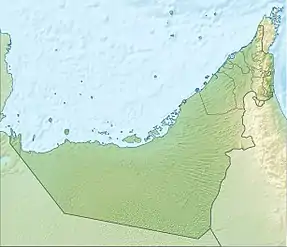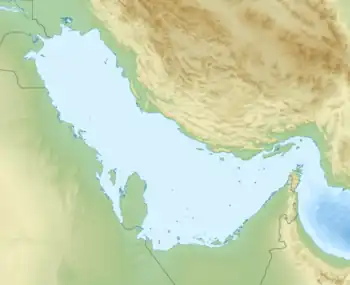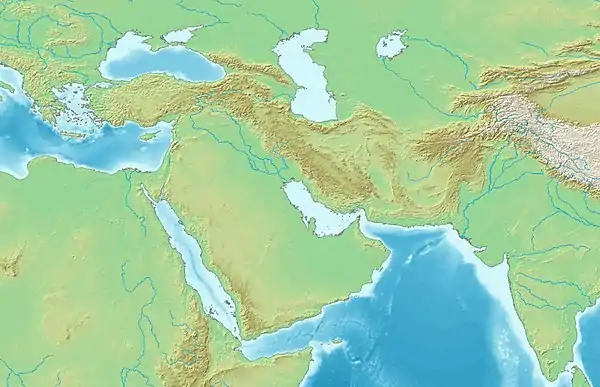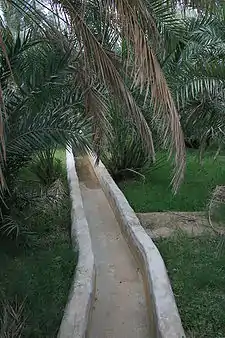Al-Ain Oasis
وَاحَة ٱلْعَيْن | |
|---|---|
 An alley in the oasis | |
 Al-Ain Oasis Location of Al-Ain Oasis in the UAE  Al-Ain Oasis Al-Ain Oasis (Persian Gulf)  Al-Ain Oasis Al-Ain Oasis (West and Central Asia) | |
| Coordinates: 24°13′01″N 55°45′43″E / 24.217°N 55.762°E | |
| Country | |
| Emirate | Abu Dhabi |
| Elevation | 292 m (958 ft) |
| Time zone | UTC+4 (UAE Standard Time) |
| Official name | Cultural Sites of Al Ain (Hafit, Hili, Bidaa Bint Saud and Oases Areas) |
| Criteria | Cultural: iii, iv, v |
| Reference | 1343 |
| Inscription | 2011 (35th Session) |
Al-Ain Oasis (Arabic: وَاحَة ٱلْعَيْن, romanized: Wāḥat Al-ʿAyn,[1][2] "Oasis of the Spring") is the largest oasis in the city of Al Ain, within the Eastern Region of the Emirate of Abu Dhabi, the United Arab Emirates.[3][4]
Geography
It is located in Al-Mutawa'a District in central Al-Ain, and east of Al-Jahili District. The border between Al-Ain City and the Omani town of Al Buraimi is to the northwest. Adjacent to the oasis are Al Ain National Museum[5][6] and Sultan Bin Zayed Fort[7] to the east, and Al Ain Palace Museum to the west. To south is Al Ain Sports Club and Jabal Al-Naqfah, a ridge of Jebel Hafeet.[8][9][10][11][12] To the southwest are Al Ain Etisalat Building and the Oasis Hospital. Al Ain Oasis is also known as Al-Jahily Falaj. It was built by Zayed the Grand.
Falaj

The oasis is known for its underground irrigation system (falaj[1][2] or qanāt), which brings water from boreholes to water farms and palm trees. The falaj irrigation is an ancient system dating back thousands of years and is used widely in Oman, UAE, India, Iran, and other countries.[13][14]
See also
References
- 1 2 واحة العين, VisitAbuDhabi.ae (in Arabic), retrieved 2018-03-28
- 1 2 واحة العين مجمع التاريخ وملتقى الجمال. Al-Khaleej (in Arabic). 2014-09-04. Retrieved 2016-10-12.
- ↑ An oasis in the heart of Al Ain, UAE Interact, 2005-10-10, archived from the original on 2017-02-23, retrieved 2017-02-23
- ↑ "Al Ain". The Report Abu Dhabi 2010. Oxford Business Group. 2010. p. 171. ISBN 978-1-9070-6521-7.
- ↑ "Al Ain National Museum". VisitAbuDhabi.ae. Archived from the original on 2018-09-03. Retrieved 2017-08-06.
- ↑ "Museum and archaeological park for Abu Dhabi". Past Horizons. Archived from the original on 2012-03-06. Retrieved 2013-12-21.
- ↑ Insight Guides Oman & the UAE (Travel Guide eBook). APA Publications (UK) Limited. 2015-12-01. ISBN 9781780055480.
{{cite book}}:|work=ignored (help) - ↑ Az-Zahiri, Harib (2008-03-07). "العين مدينة القلب" (in Arabic). Al-Ittihad. Retrieved 2019-08-15.
- ↑ "الواحة المصغرة" (in Arabic). Visit Abu Dhabi. Retrieved 2019-08-15.
- ↑ "ركض" (in Arabic). Al-Bayan. 2016-10-24. Retrieved 2019-08-15.
- ↑ Salama, Samir (2011-12-30). "Al Ain bears evidence of a culture's ability to adapt". Gulf News. Retrieved 2018-08-07.
- ↑ Yildirim, Ege; El-Masri, Sami (2010), Master Planning for Heritage Conservation in Al Ain Oasis, UAE (PDF), UAE: ADACH and ISOCARP, pp. 1–11, retrieved 2019-08-15
- ↑ Wilson, A. (2008). "Hydraulic Engineering and Water Supply". In John Peter Oleson (ed.). Handbook of Engineering and Technology in the Classical World (PDF). New York: Oxford University Press. pp. 290–293. ISBN 978-0-19-973485-6. Archived from the original (PDF) on 2017-11-07. Retrieved November 1, 2017.
- ↑ Goldsmith, Edward. The qanats of Iran. Archived from the original on 2012-01-14.
External links
- Al Ain Oasis Visit Abu Dhabi